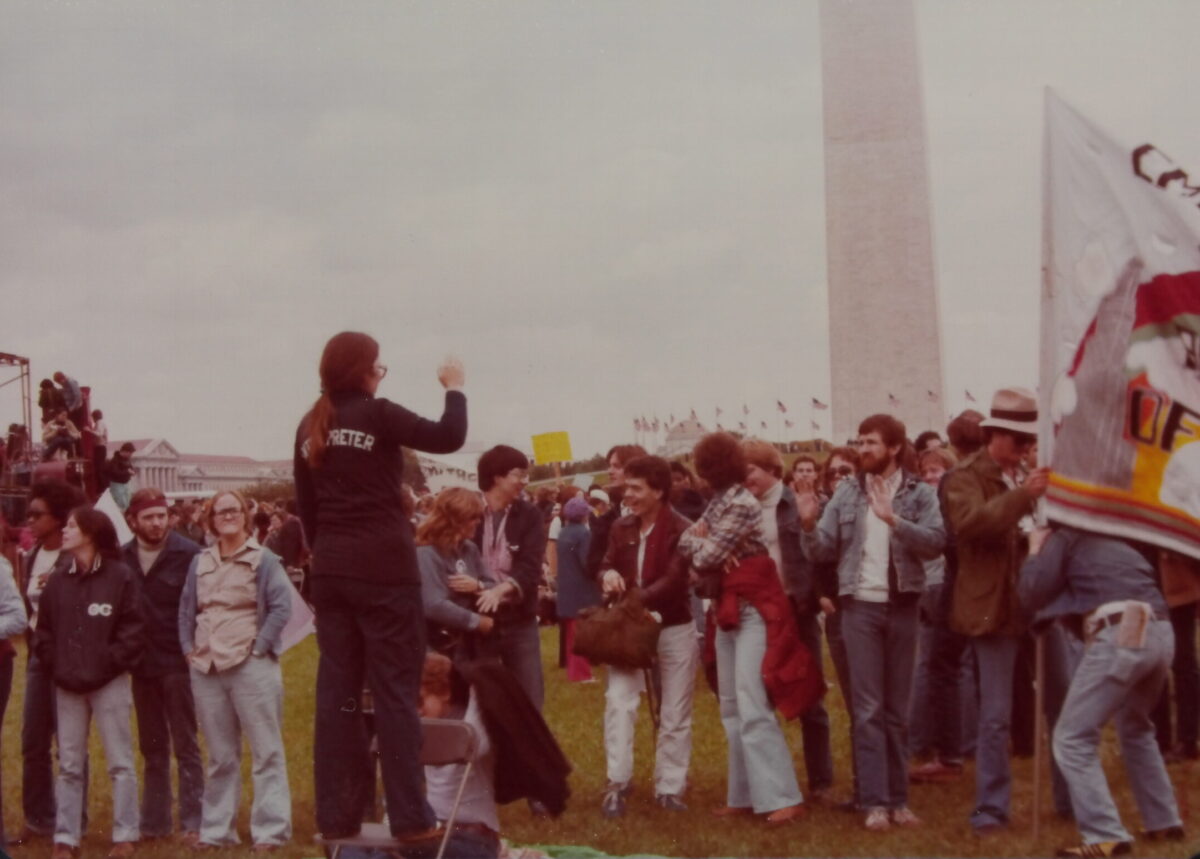How does an archive go about collecting d/Deaf history, and how does a historian go about researching it? Welcome back to our behind-the-scenes blog where we’re on a journey to uncover d/Deaf and disabled LGBTQ+ history in DC I’m your trusty guide, Emma O’Neill-Dietel, aka Rainbow History Project’s Summer Intern. In my last blog post I gave an overview of my goals and strategies for research. Today, I’m sharing a deeper look into one aspect of this history: d/Deaf LGBTQ+ community and culture in DC.
In 2023, the Rainbow History Project received a donation of photographs and newspaper clippings from Steven Frank and Ed Knight, who had been involved in DC’s Deaf LGBTQ+ community since the 1970s. When I joined RHP in 2024, I was invited to sort through the photos, which had not yet been processed into the archives. I had wondered where the d/Deaf LGBTQ+ experience lived in the historical record, and these photos were a beautiful, vibrant answer. The photos showed scores of Deaf LGBTQ+ people attending DC’s Pride Day and the March on Washington for Lesbian and Gay Rights over the years from the 1970s to the early 2000s.
Thanks to the photos, I had three organizations to trace: the Rainbow Alliance of the Deaf (RAD), the Capital Metro Rainbow Alliance (CMRA, RAD’s chapter in DC), and the Lambda Society of Gallaudet University. I needed to go beyond RHP to find context for future research and collecting. I read through the online databases of the Blade and Gallaudet’s student newspaper The Buff & Blue. In-person at Gallaudet’s archive, I read through the newsletters of the Rainbow Alliance of the Deaf and the Capital Metro Rainbow Alliance, also donated by Steven Frank.

An interpreter signs to Deaf marchers at the 1979 March on Washington for Lesbian and Gay Rights (Credit: Steven Frank and Ed Knight Collection, Rainbow History Project)
Before I could reach out to people involved in this history to ask them to share their stories or materials with the archive, I had to think carefully about my role in this project. Though I am deaf, I was raised in the hearing world and am not fluent in ASL, making me more an outsider than an insider to this community. I am not from DC nor did I attend Gallaudet. It’s important to share this information up front with Deaf community members so we understand each other’s perspectives (academics call this “positionality”).
The importance of words goes beyond how I describe myself or how individuals are described in the archive. A core component of RHP’s collection is our legacy in collecting oral histories, the team interviews people who have contributed to DC’s LGBTQ+ community. Oral histories are essential for understanding personal experiences of communities and events, so I knew I wanted them to be a part of my research. However, the word “oral” has a long and troubled history within the Deaf community. Not only is it an inaccurate way to describe how many Deaf people would give an interview, it also recalls “oralism,” the practice of privileging (and sometimes forcing) spoken language over signed language.
Many archives and public historians have opted to keep the term “oral history” for d/Deaf projects because of its familiarity, while also adapting oral history methodologies for Deaf narrators. (For some examples, see Gallaudet’s Schuchman Deaf Documentary Center and the D.C. Public Library’s Deaf Community Voices in the Heart of D.C. – Signing a Culture Oral History Project.) Deaf documentarian Zilvinas Paludnevicius uses the term “narrative history” instead to center the Deaf interview experience.
Over the coming weeks and months, I will collect narrative history interviews and continue to share what I learn. The wheels are already in motion, but I won’t say too much more for now. Until next time!
